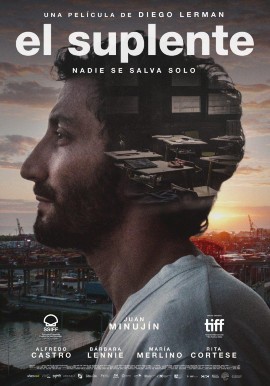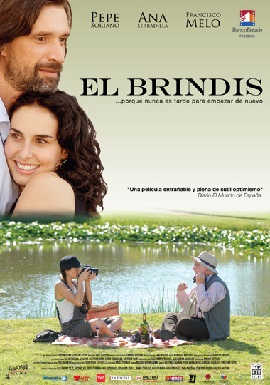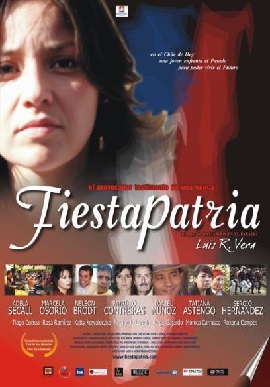
In This Tricky Life is a 2001 film directed by Beatriz Flores Silva. It was Uruguay's submission to the 74th Academy Awards for the Academy Award for Best Foreign Language Film, but was not accepted as a nominee. The film was awarded the 'Golden Columbus' at the Huelva Ibero-American Film Festival. An international co-production among companies from Uruguay, Belgium, Spain and Cuba, the film was produced by BFS Producciones, Saga Film, Avalon Productions and ICAIC.

Chilean cinema refers to all films produced in Chile or made by Chileans. It had its origins at the start of the 20th century with the first Chilean film screening in 1902 and the first Chilean feature film appearing in 1910. The oldest surviving feature is El Húsar de la Muerte (1925), and the last silent film was Patrullas de Avanzada (1931). The Chilean film industry struggled in the late 1940s and in the 1950s, despite some box-office successes such as El Diamante de Maharajá. The 1960s saw the development of the "New Chilean Cinema", with films like Three Sad Tigers (1968), Jackal of Nahueltoro (1969) and Valparaíso mi amor (1969). After the 1973 military coup, film production was low, with many filmmakers working in exile. It increased after the end of the Pinochet regime in 1989, with occasional critical and/or popular successes such as Johnny cien pesos (1993), Historias de Fútbol (1997) and Gringuito (1998).

Hidalgo: la historia jamás contada is a 2010 Mexican film directed by Antonio Serrano. The film focuses on Mexican Independence leader Miguel Hidalgo y Costilla and his involvement in the Mexican War of Independence. It premiered in Mexico City on September 16, 2010.
The Effect of Love is a 2007 Argentinian drama film, written and directed by Eliseo Subiela, an Argentinian film director. The film was shot in Buenos Aires and San Luis in Argentina.

Mónica Villa is an Argentine actress of stage, screen, and TV, as well as a researcher and educator. She earned a Best Actress award for her role as "Susana" in cult classic "Esperando la Carroza at the 1985 Festival de Cine Iberoamericano, in Huelva, Spain. She won an ACE Golden award for best leading actress in the 2002 comedy "Ojos traidores", a 2004 Premios Trinidad Guevara for best Actress of a Repertoire Company, a Premios Carlos de Oro for her 2011 performance as best lead actress in the theater production "Jardín De Otoño", and in 2015 a Premios Estrella de Mar for Best Female Performance in a Repertoire Company for "La Nona". In addition, she has been nominated for a Best Actress in a TV Special for the 2003 Premios Martín Fierro, making her acting work recognized in all three major media.

Verónica Chen is an Argentine film director, film editor, and screenwriter. She is part of the Argentine New Wave movement. In 2020, she received the Best New Director award for Vagón Fumador at the Huelva Ibero-American Film Festival.

The Memory of Water is a 2015 Chilean drama film written and directed by Matías Bize. It was screened in the Venice Days section at the 72nd Venice International Film Festival. It won the Colón de Oro for best director at the 2015 Festival de Cine Iberoamericano de Huelva.

Zanahoria is a 2014 Uruguayan-Argentine thriller drama film written and directed by Enrique Buchichio.

The Pablo Neruda Ibero-American Poetry Award is an annual award granted by the National Council of Culture and the Arts (CNCA) of Chile, through the National Book and Reading Council.

Madregilda is a 1993 film directed by Francisco Regueiro which stars Juan Echanove, José Sacristán, and Barbara Auer.
The Ariel Award for Best Ibero-American film is a film award category created in 2000, part of the Ariel Awards, which are presented by the Academia Mexicana de Artes y Ciencias Cinematográficas (AMACC).
The Seville European Film Festival is an annual film festival dedicated to European cinema held in November in Seville, Spain, since 2004.

The Substitute is a 2022 internationally co-produced drama film directed by Diego Lerman and starring Juan Minujín and Bárbara Lennie alongside Alfredo Castro, Rita Cortese, and María Merlino. It is a Latin-American and European co-production among companies from Argentina, Spain, Italy, Mexico, and France.

Forgotten Roads is a 2020 Chilean romantic drama film written and directed by Nicol Ruiz Benavides in her directorial debut. Starring Rosa Ramírez Ríos and Romana Satt.

Caracas Ibero-American Film Festival is a Venezuelan film festival. It was initially created in 2003 with the purpose of promoting Ibero-American cinema, with emphasis on first movies. Subsequently, in 2021 it restarted its activities again.

The Toast is a 2007 Chilean-Mexican romantic comedy-drama film directed by Shai Agosin and written by Roberto Brodsky. Starring Ana Serradilla, Francisco Melo and Pepe Soriano. It competed for the Colón de Oro at the 33rd Huelva Ibero-American Film Festival.

Fiestapatria is a 2007 Chilean-Peruvian drama film written, directed and produced by Luis R. Vera. Starring Adela Secall. The film competed for the Colon de Oro at the 2007 Havana New Latin American Film Festival.














